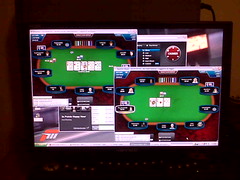 TIME reports that a sociology doctoral student at Cornell University has found that knowing when to fold ’em is a valuable skill beyond the poker table.
TIME reports that a sociology doctoral student at Cornell University has found that knowing when to fold ’em is a valuable skill beyond the poker table.
You can learn a lot about gambling if you’re willing to analyze 27 million hands of online poker. Don’t have time for that? No worries; sociology doctoral student Kyle Siler of Cornell University has done it for you. His counterintuitive message: the more hands you win, the more money you’re likely to lose — and this has implications that go well beyond a hand of cards.
Siler, whose work was published in December in the online edition of the Journal of Gambling Studies and will appear later this year in the print edition, was not interested in poker alone but in the larger idea of how humans handle risk, reward and variable payoffs. Few things offer a better way of quantifying that than gambling — and few gambling dens offer a richer pool of data than the Internet, where millions of people can play at once and transactions are easy to observe and record.
Why the more you win, the more you lose?
The reason for the paradoxical results was straightforward enough: the majority of the wins the players tallied were for relatively small stakes. But the longer they played — and the more confident they got — the likelier they were to get blown out on one or a few very big hands. Win a dozen $50 pots and you’re still going to wind up far behind if you lose a single $1,000 one. “People overweigh their frequent small gains vis-à-vis occasional large losses,” Siler says.
According to Siler, these results can be applied to life in general.
Investing, driving, buying a house and merely crossing the street are all acts that involve discernible risks and uncertain rewards. The more small returns you get from your small investments in stocks, the likelier you are to make — and lose — a big investment. The more times you get behind the wheel and speed a little bit, the likelier you are to speed a lot — with deadlier consequences.
“These kinds of calculations are made every day,” says Siler. “Adultery is another good example. People get away with it countless times but they get caught just once and they lose everything.”
The social implications?
And unlike the risks at the poker table, where your losses are just yours, in the larger world, you can take down a lot of other people with you. “Organizational malfeasance in general depends on this kind of risk analysis,” says Siler. “Look at a place like Enron. People took a lot of small chances and won, then took big chances and lost big.” Indeed, Siler points out, during the recent financial crisis, an entire nation — Iceland — went bankrupt in a similar way, trusting high-risk, high-reward investments that quit paying off.

Comments 4
Per — January 15, 2010
This article speaks to me. I was big into online poker a few years ago. My brother and I were working a slow-but-sure mathematical scheme to win. We weren't alone. What fascinated me was how, in the depths of my poker zone when I would go out into the world, the rules very much coincided with that world in general.
I guess it's not so shocking, when one thinks about it, that we create relatively "safe" games that mimic the realities and dangers of the real world without the danger. Monopoly, chess, wrestling, American football, Survivor...
Harvey Priddy — August 18, 2020
Important information that helped me.
Olivia — October 18, 2023
It's easy to see why players are attracted to this game given the potential for big prizes. Of course, there are always dangers associated with such games in general. It is important to know the rules, and, importantly, to find a reliable online resource for such leisure. I found one for myself here bento4d
Olivia — April 16, 2024
Lotteries and raffles are among the simplest forms of gambling. Participants buy tickets or pick numbers hoping to get lucky to win prizes, which can be large and significant. The main thing is to check the reliability of the online resource before you give your money, you can do it here. The opportunity to win a large sum of money makes lotteries and sweepstakes popular in many countries.